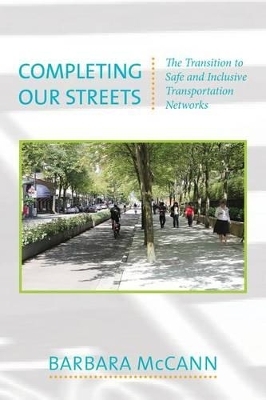
Completing Our Streets
The Transition to Safe and Inclusive Transportation Networks
Seiten
2013
Island Press (Verlag)
978-1-61091-431-4 (ISBN)
Island Press (Verlag)
978-1-61091-431-4 (ISBN)
- Titel z.Zt. nicht lieferbar
- Versandkostenfrei
- Auch auf Rechnung
- Artikel merken
The complete streets movement is based around a simple idea: streets should be safe for people of all ages and abilities, whether they are walking, driving, bicycling, or taking the bus. This book offers practitioners the strategies, tools, and inspiration needed to translate this idea into real and lasting change in their communities.
Communities are embracing a new and safer way to build streets for everyone - even as they struggle to change decades of rules, practice, and politics that prioritise cars. They have discovered that changing the design of a single street is not enough: they must upend the way transportation agencies operate. Completing Our Streets begins with the story of how the complete streets movement united bicycle riders, transportation practitioners and agencies, public health leaders, older people, and smart growth advocates to dramatically re-frame the discussion of transportation safety. Next, it explores why the transportation field has been so resistant to change - and how the movement has broken through to create a new multi-modal approach. In Completing Our Streets, Barbara McCann, explains that the movement is not about street design. Instead, practitioners and activists have changed the way projects are built by focusing on three strategies: reframe the conversation; build a broad base of political support; and provide a clear path to a multi-modal process.
McCann shares stories of practitioners in cities and towns who have embraced these strategies to fundamentally change the way transportation projects are chosen, planned, and built. The complete streets movement is based around a simple idea: streets should be safe for people of all ages and abilities, whether they are walking, driving, bicycling, or taking the bus. Completing Our Streets gives practitioners and activists the strategies, tools, and inspiration needed to translate this idea into real and lasting change in their communities.
Communities are embracing a new and safer way to build streets for everyone - even as they struggle to change decades of rules, practice, and politics that prioritise cars. They have discovered that changing the design of a single street is not enough: they must upend the way transportation agencies operate. Completing Our Streets begins with the story of how the complete streets movement united bicycle riders, transportation practitioners and agencies, public health leaders, older people, and smart growth advocates to dramatically re-frame the discussion of transportation safety. Next, it explores why the transportation field has been so resistant to change - and how the movement has broken through to create a new multi-modal approach. In Completing Our Streets, Barbara McCann, explains that the movement is not about street design. Instead, practitioners and activists have changed the way projects are built by focusing on three strategies: reframe the conversation; build a broad base of political support; and provide a clear path to a multi-modal process.
McCann shares stories of practitioners in cities and towns who have embraced these strategies to fundamentally change the way transportation projects are chosen, planned, and built. The complete streets movement is based around a simple idea: streets should be safe for people of all ages and abilities, whether they are walking, driving, bicycling, or taking the bus. Completing Our Streets gives practitioners and activists the strategies, tools, and inspiration needed to translate this idea into real and lasting change in their communities.
Barbara McCann served as the founding Executive Director of the National Complete Streets Coalition and Director of Information and Research at Smart Growth America (SGA), where she authored the report Measuring the Health Effects of Sprawl. McCann is also a co-author of Sprawl Costs and editor of The Option of Urbanism by Chris Leinberger.
| Erscheint lt. Verlag | 1.12.2013 |
|---|---|
| Verlagsort | Washington |
| Sprache | englisch |
| Maße | 153 x 229 mm |
| Themenwelt | Sachbuch/Ratgeber ► Natur / Technik ► Fahrzeuge / Flugzeuge / Schiffe |
| Naturwissenschaften ► Geowissenschaften ► Geografie / Kartografie | |
| Sozialwissenschaften ► Politik / Verwaltung ► Staat / Verwaltung | |
| ISBN-10 | 1-61091-431-7 / 1610914317 |
| ISBN-13 | 978-1-61091-431-4 / 9781610914314 |
| Zustand | Neuware |
| Haben Sie eine Frage zum Produkt? |
Mehr entdecken
aus dem Bereich
aus dem Bereich
wie wird man Fachkundiger für Arbeiten an Hochvolt-Systemen im …
Buch | Softcover (2023)
Paul Christiani (Verlag)
CHF 95,15
Technik 1+2
Buch | Hardcover (2020)
Vogel Communications Group GmbH & Co. KG (Verlag)
CHF 179,95
Buch | Hardcover (2022)
Vogel Communications Group GmbH & Co. KG (Verlag)
CHF 109,95


